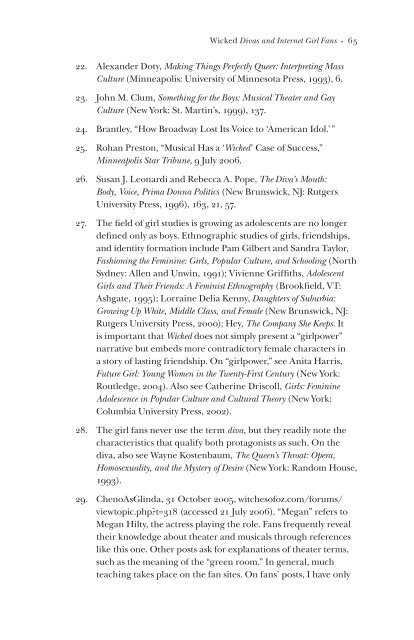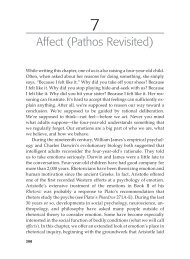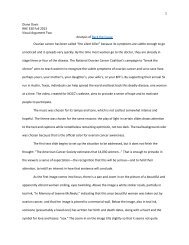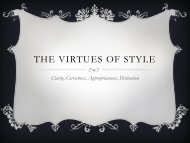(Kristin Chenoweth) and Elphaba - Camera Obscura: Feminism ...
(Kristin Chenoweth) and Elphaba - Camera Obscura: Feminism ...
(Kristin Chenoweth) and Elphaba - Camera Obscura: Feminism ...
- No tags were found...
You also want an ePaper? Increase the reach of your titles
YUMPU automatically turns print PDFs into web optimized ePapers that Google loves.
Wicked Divas <strong>and</strong> Internet Girl Fans • 65<br />
22. Alex<strong>and</strong>er Doty, Making Things Perfectly Queer: Interpreting Mass<br />
Culture (Minneapolis: University of Minnesota Press, 1993), 6.<br />
23. John M. Clum, Something for the Boys: Musical Theater <strong>and</strong> Gay<br />
Culture (New York: St. Martin’s, 1999), 137.<br />
24. Brantley, “How Broadway Lost Its Voice to ‘American Idol.’ ”<br />
25. Rohan Preston, “Musical Has a ‘Wicked’ Case of Success,”<br />
Minneapolis Star Tribune, 9 July 2006.<br />
26. Susan J. Leonardi <strong>and</strong> Rebecca A. Pope, The Diva’s Mouth:<br />
Body, Voice, Prima Donna Politics (New Brunswick, NJ: Rutgers<br />
University Press, 1996), 163, 21, 57.<br />
27. The field of girl studies is growing as adolescents are no longer<br />
defined only as boys. Ethnographic studies of girls, friendships,<br />
<strong>and</strong> identity formation include Pam Gilbert <strong>and</strong> S<strong>and</strong>ra Taylor,<br />
Fashioning the Feminine: Girls, Popular Culture, <strong>and</strong> Schooling (North<br />
Sydney: Allen <strong>and</strong> Unwin, 1991); Vivienne Griffiths, Adolescent<br />
Girls <strong>and</strong> Their Friends: A Feminist Ethnography (Brookfield, VT:<br />
Ashgate, 1995); Lorraine Delia Kenny, Daughters of Suburbia:<br />
Growing Up White, Middle Class, <strong>and</strong> Female (New Brunswick, NJ:<br />
Rutgers University Press, 2000); Hey, The Company She Keeps. It<br />
is important that Wicked does not simply present a “girlpower”<br />
narrative but embeds more contradictory female characters in<br />
a story of lasting friendship. On “girlpower,” see Anita Harris,<br />
Future Girl: Young Women in the Twenty-First Century (New York:<br />
Routledge, 2004). Also see Catherine Driscoll, Girls: Feminine<br />
Adolescence in Popular Culture <strong>and</strong> Cultural Theory (New York:<br />
Columbia University Press, 2002).<br />
28. The girl fans never use the term diva, but they readily note the<br />
characteristics that qualify both protagonists as such. On the<br />
diva, also see Wayne Kostenbaum, The Queen’s Throat: Opera,<br />
Homosexuality, <strong>and</strong> the Mystery of Desire (New York: R<strong>and</strong>om House,<br />
1993).<br />
29. ChenoAsGlinda, 31 October 2005, witchesofoz.com/forums/<br />
viewtopic.php?t=318 (accessed 21 July 2006). “Megan” refers to<br />
Megan Hilty, the actress playing the role. Fans frequently reveal<br />
their knowledge about theater <strong>and</strong> musicals through references<br />
like this one. Other posts ask for explanations of theater terms,<br />
such as the meaning of the “green room.” In general, much<br />
teaching takes place on the fan sites. On fans’ posts, I have only










